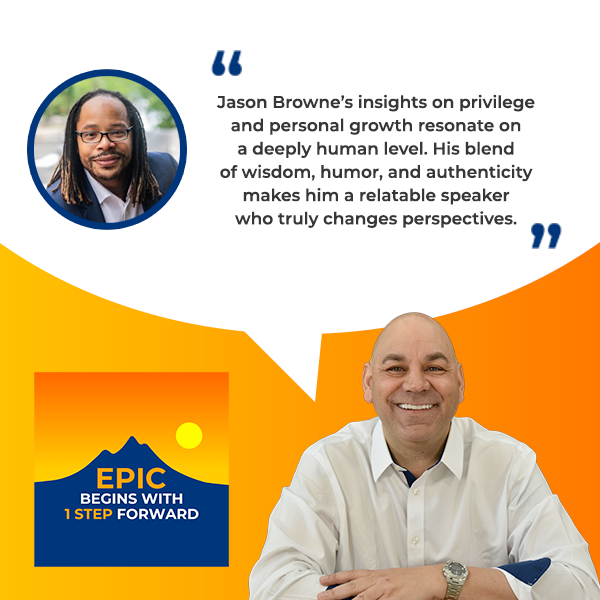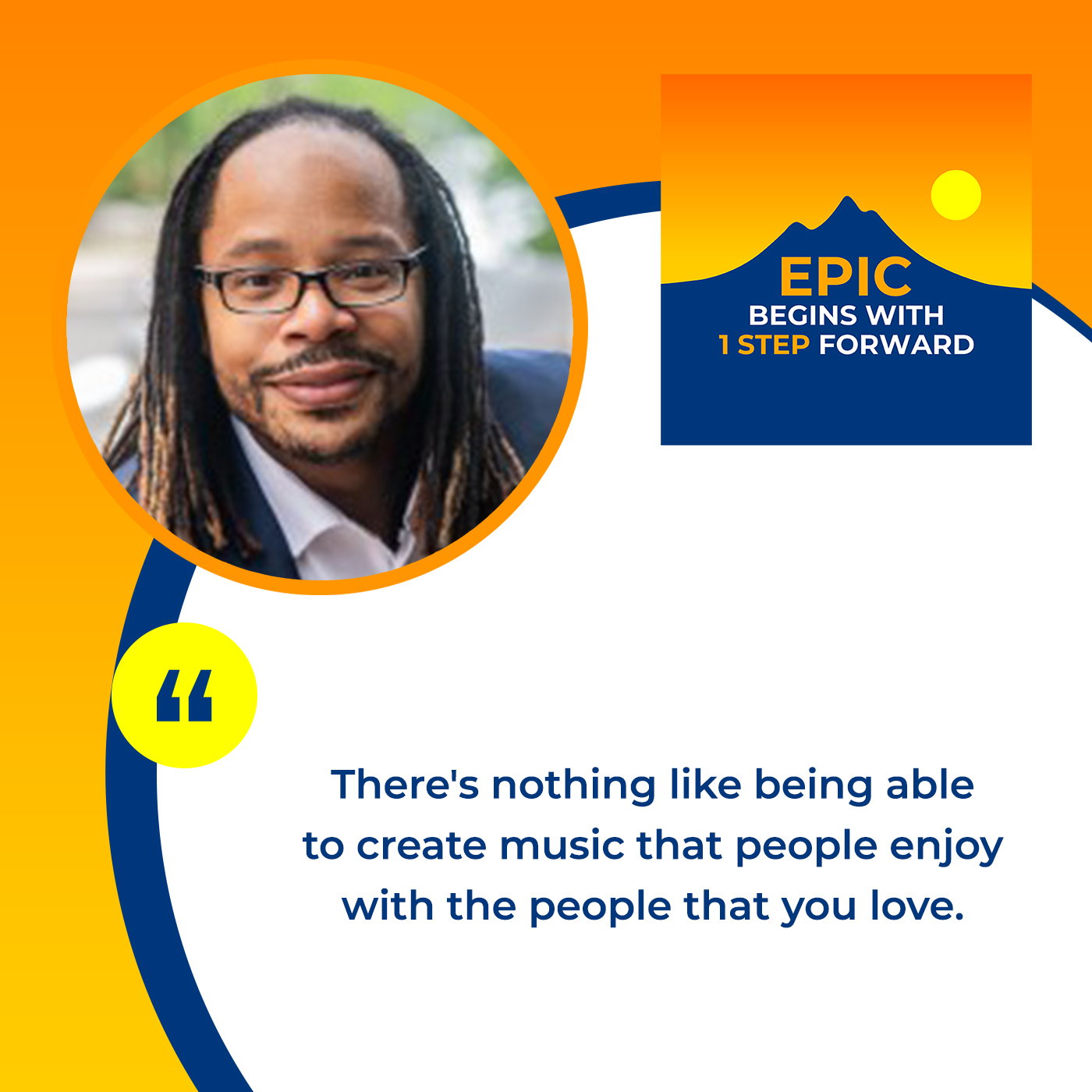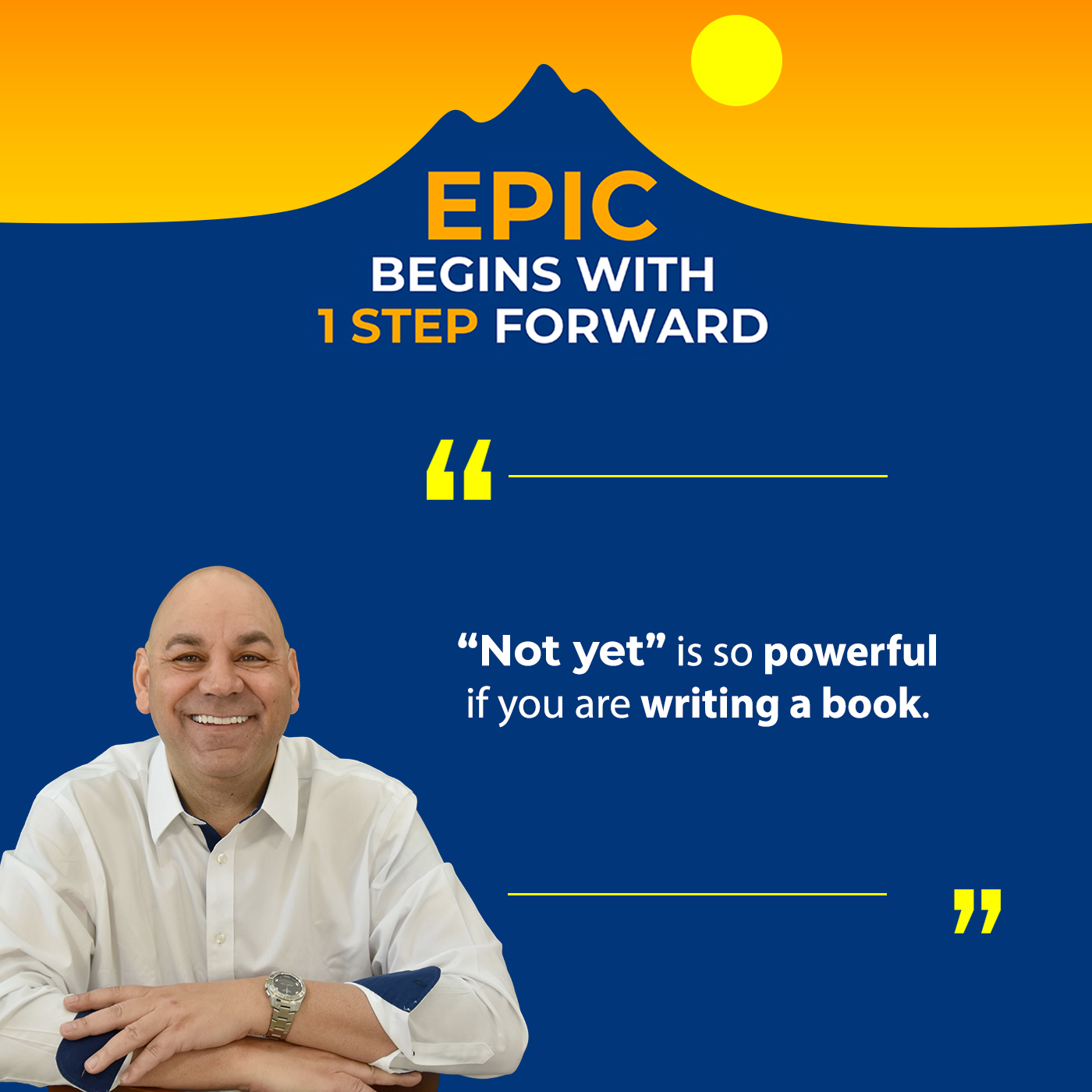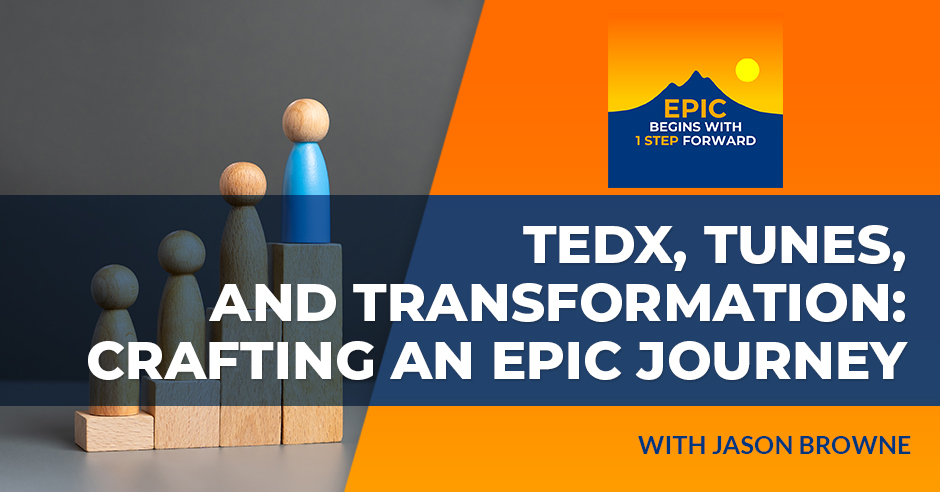—
Watch the episode here
Listen to the podcast here
TEDx, Tunes, And Transformation: Crafting An Epic Journey
Introduction
Welcome back to another exciting episode of Epic Begins with One Step Forward. I’m your host, Zander Sprague, and I am joined by Jason Browne. Jason, tell us who you are and what you do.
First of all, I don’t have a cool name like Zander, but my name is Jason Browne, and I am a person that does a little bit of everything. I’m fairly well. The only thing that I’m like an expert in is the thing that I don’t do much anymore, which is making music. I am one who just had a TEDx talk this year on the possibilities of privilege. Go and look it up on YouTube. I think it’s one of the premier speeches that I’ve given.
I give speeches around the world. I give talks around the world. I’ve done radio for eight years. I’ve done IT. I work with organizations and corporations. I work with social media. Just tell me what the topic is. I’ve probably done something in that space. I even one time was the navigator in a race car. I’ve done a lot. Just let me know what you want. I’ll provide it to you, Zander.
There you go. Jason, thank you. I can say that right off, you do have that silky radio voice.
Thank you. That’s all because of my father’s genes. This voice box I practiced, but that comes from things that parents do.

You mentioned that you used to do music, not so much these days. What did you do with music? What was it that made it so epic for you?
There is no feeling that I’ve still experienced that is similar to being on stage with a band that you really groove with, playing a song that you have written, and having the crowd be with you the entire time. Music is one of the things that connects with me, and I think connects with most humans. In fact, I think music is often missed. There’s a missed opportunity when presentations are given, when conferences are had. They shortchange what music can, how important that element can be to the whole package.
For me, music is a very integral part of who I am. I listen to music all the time. It’s one of the only things that triggers, that can get me emotional. I could be in front of something very serious, and I’ll be fine. If you play the right music along with it, and sometimes I do it intentionally, it triggers that emotion for me. From an emotional level, it’s there. Also, from a family level, the band that I had back in the day, they were my family. Most of them still are my family, not literally my family.
We have many families, Jason. I’m a firm believer that you’re born with the families you make.
To summarize this music thing, it just feels amazing to be able to share that type of creativity in such a connective way. Visual art doesn’t do it in the same way. Other arts, to me, don’t completely captivate it. Dancing is close, but there’s nothing like being able to create music that people enjoy with the people you love.

I agree that music is incredibly evocative of many things, happiness, sadness, joy, all of those things. There are certainly songs that, when they come on the radio, take me right to a certain place and a certain experience that I was having, or a memory, or whatever. You agree there’s absolutely times where I put on a particular song because I want to hear this song. I totally agree. I think whatever your creativity is, obviously resonates in you, and it’s something that brings you great joy to create. I think that’s awesome. I just have not yet written a song.
Zander, we will work together and make you a theme song for this podcast. I will help you. If you want to do that, let me know, we will make this song.
We’ll see. I think we only need a theme song that’s on our cell phone that they’re like, “I’m coming into a room. Let me put on the Zander song.” There you go.
For sure.
Jason Browne’s TEDx Talk: The Possibilities Of Privilege
That’s great. You did a TED talk, which is cool. I’m working on my TED talk, and that’s trying to get it picked up. It’s a very interesting process, but for you, what was it like getting to do your TED talk?
The big thing for me was, ever since I started the process of wanting to speak on stage and getting comfortable and knowing that something that I would love to do, being on the TEDx stage is something that you just got to do. It’s like, if you’re a public speaker, you just got to do it right. Kind of like a rite of passage. The thing to me though, is I hadn’t come up with the topic that really clicked for me, that justified me going after it. It’s the same idea for writing a book. It’s the same idea for many things in life for me. To do it is fine, but I want to be able to do it with something that I’m like, “I stand behind that” or “That’s unique” or “I’ve not thought about it in this way” or something similar. One time, I was writing a talk for a conference and it was all about, there is a diversity conference or diversity talk.
I can’t recall at this point. I was like, “I’m tired of explaining this in the same old ways. Let me figure out some new way of approaching this.” I was like, “I don’t want to even talk about diversity. I want to talk about like, I don’t know, let’s talk about privilege. What’s the topic that nobody wants to talk about?” I was like, “Privilege. Cool. Let’s talk. Let’s talk about that. Let’s figure out some unique, weird angle with that. That’s different.” It wasn’t until I did that a couple of times in front of a few folks that I was like, “This is actually pretty unique. I’m having different kinds of conversations as a result of it.” I was like, “I think I’ve found the key to the TEDx talk because TED is based upon an idea worth sharing.” While it is needed for folks to have a great presence on stage and the ability to speak, which I apparently can’t do the ability to speak, the concept itself is more important, in my opinion.

Epic Journey: TED is based upon an idea worth sharing. While it is needed for speakers to have a great presence on stage and the ability to speak, the concept itself is more important.
I agree. Going through this process for a TEDx talk is, I can talk like you, I could talk on many different things, and they would be interesting. I love being on stage too. The idea is, what is that unique idea? Something that you said, which I know I’ve experienced a few times in my life, is that you try really hard to think of whatever that idea is, and it doesn’t work. You come into it from the side or somehow from behind, but not head on. My first book came because I was having coffee with a friend of mine, and she made an offhanded comment. My first book was about losing your sibling, something that I’ve done and she had done. I met her, I’m like, “How are you?” She goes, “I’m good. I was just at Borders, for those younger listeners, that’s a store where they actually had books. You could go in and touch them with your hand and look at them. Anyway, she goes, ‘There were lots of books on loss of a parent, loss of a child, but none on loss of a sibling.'” I’m walking away, and I’m like, “I know that. I could write a book on that.” Up to that point, I thought, “I should probably write a book because as a speaker, if you have a book, all of a sudden, you’re a better speaker.” Funny.
If you have a book, you are a better speaker.
It’s how it works.
It’s a funny axiom. Somehow, I’m a better speaker because I have a book. I’m not sure how by writing a book, my oratory skills are better, but it does. It’s one of those things.
It’s just a fact. It’s like, does gravity exist on earth? Yes. If you have a book, you’re a better speaker. That’s just the truth. It’s just how it is, everybody.
That whole thing came because I was like, I know that. I tried to think about what I might write a book on because I was a professional speaker. I thought, I need a book, but I had no idea what the heck I was going to write a book on. I think very much in our epic dreams, our epic journeys often happen, not from direct, front-on intention, but because you just said, “I’d like to do this,” and then you feel, “How can I do that?” That resonates with me a lot. I know in all the speeches, the things that come pouring out of my mouth, I’m always surprised at what the audience grips on.
That’s true.
Having done lots of speeches in my life, there’s the things I think are going to be the thing that the audience is really going to grab onto. Oftentimes, it’s not that, it’s some other thing. That’s the lead-up to what you think is your aha moment.
I agree with that. You said earlier on that you have to look at it from the side and not directly on. When you have a really interesting concept, you have to do it like that old magic eye pictures. You know what I’m talking about? The ones with the 3D image. You have to blur your eyes a little bit and defocus to then see the cool piece of it. You’re like, “I see it.” That’s where I think the magic happens. It’s hard to do because you want to focus, you want to hyper-focus. I gave myself some time to really figure it out. That was the beauty that I found, and that was fine. Give myself the ability to do that.
I agree. I think sometimes you have an inkling of the idea, but it hasn’t fully formed. You don’t know. As you were out talking about that, you figured out what the audience was, what was resonating with the audience. What part of that idea was resonating? I found that my Epic Begins One Step Forward, things that seem to resonate with people were not the things I thought might resonate.
I got enough experience now to say, I’m going to put it all out there and I will let other people, I’ll let the audience tell me what are the concepts that they find interesting, and then I can obviously go in the same way with music. You create music, your audience will tell you, “We really like that song.” Maybe you thought, “I wrote three songs and I really think people are going to like this one.” Not that they dislike it, but they really like this other one more. You’re like, “Hey.”
That’s happened a few times. Some of my best buds, I still think of this one song I made. I just made it in like ten minutes. I was like, “This song’s dumb.” He’s like, “Jason, that’s the best song you’ve ever made.” I was like, “What?” Until this day, he will still say that’s the best song that I’ve made. I’m like, “Okay.”
Jason, there are a lot of songs that we know and we’re like, “That’s a great song.” The artist says that they did it in ten minutes. They did it in two minutes. It didn’t take weeks to try, and they’re like, “I just had this idea or this some little niggle came in my head and I thought, that’s kind of cool and let me run with it.”
I have to be honest. I have not read your book, but I would have to imagine that that is a component of this first step forward is like, “Tell me I’m wrong, but if you overthink the first step, then you’re never going to take it.”
If you overthink the first step, you are never going to take it.
There’s that. I think for me, the concept of Epic is we have big things that we want to do. We talked about it. Someday I want to write a book. I want to run a marathon. I want to write a song. I want to do a TEDx talk. I want to do whatever. We start overthinking all of it. I have to do this, and I have to do this. For me, Epic things that I’ve achieved in my life literally began with one step forward, where I just said, “I don’t have the whole plan, but I’m going to still take that step forward.” You find that that first step isn’t nearly as difficult as you imagined it was. You go, “Okay.” Sometimes it is.
Overcoming Fear And Taking The First Step
If you decide to run a marathon and you haven’t been running, and you go out and run your first quarter mile, I’m not saying that you’re like, “That was easy. I’m ready to go 26.2.” You’re like, “I got that done. I need to step it up.” All in all, walking out the door with running shoes on and moving your body forward isn’t all that difficult in our lives. I think sometimes we all dream about these things. Some of us do it, but not because we do it just because we’re like, “I’m going to try.”
I can identify with that really closely. The call right before this, I was talking to my counselor and I was expressing to her like, “2024 has been one of the most interesting years of my life.” Largely, it has come down to these first steps, these moments of somebody has an idea. I’m like, “Cool, Jason, you want to do it?” I’m like, “Sure, why not?” It unfolds and transforms into these things that I’ve never expected. It takes this level of vulnerability and this level of trust in yourself and this level of like, “This might end terribly,” of accepting the fear that comes with that entire process and being like, “It’s not easy, but I do have to say, like, that was a foundational point, an aspect of 2024.” It was one of the most amazing years of my life.
I do think we get caught up. I talk to so many people about their epic dreams and stuff. Honestly, the two top things, “I don’t know all the steps I have to take.” I don’t either, but I’m still moving forward. And, “I don’t want to fail.” Here’s something that’s really true, Jason, the only thing that you’re guaranteed to fail at 100% are the things that you don’t try. If you never try, you’re absolutely 100% going to fail at it. Back to the matter is, we all fail at stuff on a daily basis. “I’ve got to make this phone call,” and you didn’t make it. Jason, you failed to call the bank to tell them you moved or whatever, and yet you’re beating yourself up because you didn’t do it.
To me, there are two things that allow someone to be able to not get sucked into the failure of something, whatever that means. Because that can mean a lot of different things. Let’s just assume that failure means whatever the worst thing is that’s in your brain. The two main ways that I at least can see a way out of that, one, you have a support system. If I know that, no matter what happens, if I were to take the wrong step, I have a support system, that I have friends, that if I ever needed to be like, “I need your help,” they’re going to be like, “I got you. Let’s do this.” It goes both ways.
I feel like I have a support system, and not everybody has that. Not everybody has that support system that they can trust in order to help pick them back up. That I respect. If there’s anything that I can leave, I guess a note on this point for folks who are listening, is if you could find a way to be, in a healthy way, that resource for somebody so that they can fail more, I would highly encourage that for you, to find somebody to do that.

Epic Journey: If you could find a way to be a healthy resource for somebody to fail more, do it.
Failure is part of the journey. We’re going to, no matter what we do, be it writing music, writing a book, running a marathon, along the way, you’re not going to be 100% at it. In my book, I talk about the baseball analogy, which is to say people make it into the Hall of Fame because they have a lifetime batting average of over 300, which is great. I’m not taking anything, I’m not a baseball player. I realize how very challenging and awesome that is. Imagine in your own daily life, Jason, let’s say there’s nine hours of work-life type stuff that you’re doing. If you were to have a Hall of Fame Day, you only get to get three hours. That means six hours can be complete and utter strikeout, flyout, failure. Yet, you get to, at the end of the day, go, “That was a Hall of Fame Day. Look at me.”
That’s the reason why I think support systems are so valuable, because the world tells you that you’re supposed to be striking 100%. That’s not true. That’s why I appreciate my friends. My friends will keep me in check. They’ll be like, “Jason, you’re batting a point. You’re batting 50%. That’s pretty dang good. Why don’t you stop complaining, have this cheeseburger, and like, let’s call it a day?” That’s the reason why friends are so important, especially when you’re trying to fail. They keep you in check. They let you know of your successes. They remind you of your successes.
They do. People who listen all the time, like, here it comes again, I’m going to say it’s in my book, it’s what I call the 97-3 rule, which is I believe that 97% of your day is really good, and up to 3% isn’t so good. Obviously, we have days where that 3% is bigger. It was a really bad day, but in general, it’s really good. Yet, we seem to focus on that 3% that didn’t go right and completely ignore the 97%. I came up with this because when I was doing my licensing internship, I was working in a school-based counseling with a middle school and high school.
A lot of my clients had academic issues. I asked them what their least favorite subject was. A lot of them said math. I’m like, I get that. Math wasn’t my favorite either. I asked them, “You got a 97 on your next test. How would you feel?” “I’d be so excited. My parents would be so proud. I’d tell all my friends.” I’m like, “Would you be complaining about the three points you didn’t get?” “Are you kidding? I got a 97.” I’m like, “Why in your own life are you just focusing on just the stuff that didn’t go right? There’s all this stuff that did go right.” Jason, you and I woke up this morning. I’m not trying to be modeling. That’s a good start.
This really ties to the possibilities of privilege. Go and watch the TEDx talk, Jason Browne, Possibilities of Privilege. I would love to have your comment on this topic, but it ties back to this. Granted, you were like, “We woke up this morning,” which a lot of people might say, and it’s like, “I’ve heard that before.” Let me add a layer to this. You woke up this morning in a house. You woke up this morning with your partner. You woke up this morning with your kids in your house. You woke up this morning with heat. You woke up this morning with water coming out of a faucet. You woke up this morning with warm water. You woke up this morning with coffee readily available. You woke up this morning and then you went to Starbucks.
Any of those things are aspects of our lives that are part of the 97% of the greatness, but sometimes we fail to recognize that these things are indeed not only benefits and pluses and blessings that we do have, but there are areas of our lives that we can use to better other people’s lives as well and our own lives even further. While that might be like, “I woke up this morning,” there is so much depth to just acknowledging the things that seem to be invisible on a day-to-day basis. Find one thing you didn’t appreciate yesterday that you can appreciate today, and that is part of that equation of learning how to appreciate what you have, which is one of the possibilities of privilege.
There are areas in our lives that we can use to better other people’s lives and our own lives even further.
Why “Not Yet” Is A Powerful Mindset
Before we run out of time, I’d love to ask my guests this question. I think that one of the most important parts of our epic journey are two words, not yet. Not yet is so powerful. If you’re writing a book, has your book come out? Not yet. Not no. No is such a harsh stop that makes it sound like it’s never going to happen. When I was training for my marathons, have you run your marathon? Not yet. Why? Because it doesn’t happen for two more months.

It’s still going to happen.
It’s still going to happen. There are so many things that are not yet. If someone’s a freshman in college, you don’t say, “Do you have your degree yet?” Why? Because we understand, no, not yet, because they got to go through at least, I’ll say, three years if they’re trying to accelerate it, but you got a time period that it takes you time. Jason, are you done with that song? Not yet. Doesn’t mean you’re not, you’re just not yet. My question for you, Jason, is what are 1 or 2 of your not yet? It can be professional, personal, whatever.
I’m going to challenge you, and then I’ll answer your question. As a musician, one of the hardest things to do is to finish a song. The words not yet can also be a way of preventing the finalizing of something, as opposed to it being like, “I haven’t accomplished it yet.” I know that I’ve worked on songs that had a hundred tracks, and there was a song that I made back in 2010, and I just released it this year. There is a point in which not yet needs to just be like, Just do it. I wanted to make that one comment before I answer the question.
You could use it as an excuse, but I guess I’m talking about those things that we say in our life, “I’d really love to do it,” and it’s “not yet.” You’re leaving open the possibility that you could still do it. There may be things that you think, ” I love flying. I’d love to get my pilot’s license.” I don’t know if I’ll ever do it, but it’s certainly on my not yet.
I think the reason why, when it comes to music and me not saying not yet, not finishing a song is more about perfection. I love to have it perfect. I don’t need to have it perfect. That being said, the thing that I want to say not yet about in life is that I’ve spoken on stages around the world. I’ve had people tell me that I’ve changed their lives. I’ve had people tell me that they’ve changed the path that their nonprofit or their organization was going in because of something that I said. Just like you said, if being on stage and somebody says something, I’ve had those moments. Yet, I still don’t feel as though that I’ve made an impact in a way that is significant enough. The thing that is not yet for me is, I think, I have more to give to the benefit of more people in a more significant way. I have not yet been able to accomplish that.
That’s wonderfully profound, Jason. I like that a lot because that resonates with me. I can touch lots of lives, but I too would like to help more people. I don’t know if it’s because giving a speech is a fabulous thing. Good day when I get to be on stage, let me tell you. But how do we know? You talk about, “I’ve had an impact.” How do I measure that I’ve had the impact? Is it that 10,000 people came to listen to me? Maybe, but I don’t know.
The one instance that I can give, and this just happened to me, was I gave a talk about M&Ms and how it made membership memorable. That talk I gave back in 2020, and it was the first time I ever gave it. This year, I had somebody tell me that they heard that talk. They then shaped their entire year as a leader of their organization around that concept. It was so much so that others bought them. There was at least one person that made this leader custom-made earrings out of M&Ms because it also impacted them and, as a result, made them understand just how important the message of making membership memorable was. I’m not one to say that I said something good.
I got no negative feedback and therefore I’ve made an impact. I wait until there is a moment in which I have some tangible. She showed me the earrings. It wasn’t just a side thing. It was like, these are a gift to me, and these are not cheap. It was like, it has to be something with evidence based. It has to be something that’s not just on a survey. It has to be the look in someone’s eyes when they’re telling you about the connection that was made. You have to see how an organization is shifted from day one of the year to the 365th day of the year. It has to be something that is palpable, touchable, and audible, even if it’s musical. There has to be something real. At that point, I can say there has been an impact. I’m very critical about that.
The tangible is obviously really important. I guess I should have said, what’s that tangible point or moment that allows you to say, “I’ve done that?” As is the case with any of these wonderful Epic goals, we achieve them, and it feels great, but then you’re like, “Now what?” I was so excited when I finished my first marathon, but honestly, about fifteen minutes later, I’m like, “I set my goal. I did it. I’m happy.” I’m not discounting it, but now what? I’ve done all this. Now I’m able to do this. I signed up for another marathon. That’s what a lot of people do. You’re like, “I really want to write a song,” and you publish a song and maybe you hear it on the radio. Do you stop, or are you like, “That was really cool. I’d like to do more?” You got up on one stage where you’re like, “That’s great.” You’re like, “I like that. I’d like to do that again.” Now, where?
Philosophy Of Ikigai And Finding Fulfillment
I know we’re getting close on time, but real quick, how much have you talked about Ikigai? It’s not a town. It is a Japanese philosophy that I tell everybody that I can. I was just talking about it 45 minutes ago, and I got to just tell you. The reason why this is important is it ties to this idea of how the things that you do and what value it brings. Ikigai is the cross-section of four questions it is what you love to do, what you’re good at, what the world needs, and what you can get paid for. If you can find a place that is exactly in the middle of those things, then you’re going to continue the most fulfillment that you can, because there are different levels.
For instance, you completing a marathon, a trance, and giving speeches, and all these things come together and finding the sweet spot of what evolves in that space. I think, in the context of those four questions to me, and this is not a concept I came up with. This is way too smart for me, but I love it. It’s like, that’s where I point to when I’m like, what’s the next thing? What fits those four questions?
That’s great. Thank you for sharing that. I’m going to glom onto that because I totally get, where’s that sweet spot where it’s not so much work as it is joy and everyone else sees it. They see it emanating from you that you’re in your sweet spot, and people are like, that’s awesome. Jason, this has been an incredible conversation. Thank you so much. Dare I say an epic conversation?
There it is. There’s the name.
How can people get ahold of you? How can they find you?
First of all, I want to say this episode has been Zanderful. The second of all, the only thing is just go watch the TEDx talk. You can follow me in all the wonderful places too, but like, check, I would love to just see one comment from you on the TEDx. Just be like, that was cool. That was dumb. Here’s why I disagree with you. Here’s some cool other points, whatever it is. You can tell me what you have for breakfast. Just leave a comment. Let me know what you think. Find me there. If you’re curious, find me other places too.
Epic Choices Lead To An Epic Life
Thank you so much, Jason. I want to remind everyone that if you’re interested in beginning your epic journey, go to EpicBegins.com. I want to let everyone know that, coming early in 2025, there’s going to be an Epic Begins with One Step Forward TV show starting. Excited about that. As always, I want to remind everyone that epic choices lead to the epic life that you want.
Important Links
About Jason Browne
 Welcome Jason Browne, a masterful storyteller and seasoned speaker. With an MBA, Jason has collaborated with industry giants like Facebook, Microsoft, and Rotary International.
Welcome Jason Browne, a masterful storyteller and seasoned speaker. With an MBA, Jason has collaborated with industry giants like Facebook, Microsoft, and Rotary International.
He recently captivated audiences with a TEDx talk offering a surprising perspective on privilege. Away from the podium, Jason enjoys salsa dancing, playing basketball, creating music, and kayaking.
Today, he’s here to give us a preview of his eagerly anticipated podcast and share insights from his forthcoming book, both dedicated to exploring the transformative possibilities of privilege.

